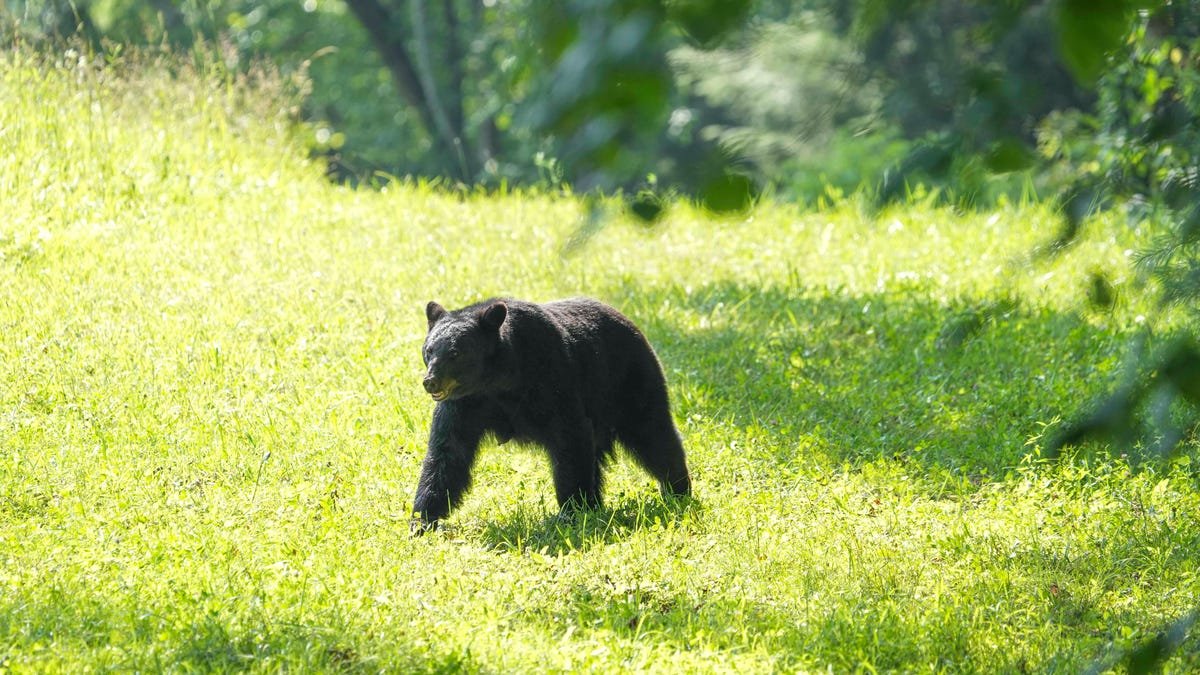how to react to charges, prevent bear attacks
See what has this bear bolting into the woods
A black bear was shocked when it wandered in front of a motion-activated sprinkler, immediately bolted.
A black bear has been spotted by multiple Jo Daviess and Carroll County landowners over the past several weeks, according to an Illinois Department of Natural Resources press release.
The bear was seen in the vicinity of Mississippi Palisades State Park and, in recent days, near private residences south and east of Galena.
Though seeing a bear may be rare, the department urges Illinois residents to treat them as wild animals and act safely.
Here’s what you should know.
How to stay safe from bear encounters
The IDNR advises Jo Daviess and Carroll County residents to avoid direct encounters with this bear and to check their property for food sources that may attract it. Through learned behavior, bears often investigate anything that may yield a food reward, such as bird feeders, barbeque grills, garbage cans and dog food. Once a bear finds a food source, it will likely return, so prevention is key.
The department recommends the following BearWise safety tips for avoiding bear encounters:
- Never feed or approach bears.
- Secure food, garbage and recycling.
- Remove bird feeders where bears are active.
- Avoid leaving pet food outdoors.
- Thoroughly clean and store grills and smokers after each use.
- Alert neighbors to bear activity.
What to do if you encounter a bear
The National Park Service recommends the following tips to help keep a bear encounter from escalating:
- Identify yourself as a human by talking calmly and remaining still. Stand your ground and slowly wave your arms. It may come closer or stand on its hind legs to get a better look or smell, but this is normally a sign of curiosity.
- Stay calm. Talk in low tones and avoid screaming, sudden movements, high-pitched squeals and imitations of bear sounds.
- Pick up small children immediately.
- Hike and travel in groups. Groups of people are usually noisier and smellier than a single person, meaning they can alert bears of their presence from a greater distance and intimidate them with their cumulative size.
- Make yourselves look as large as possible.
- Do NOT allow the bear access to your food.
- Do NOT drop your pack.
- If the bear is stationary, move away slowly and sideways. This allows you to keep an eye on the bear and avoid tripping in a non-threatening way.
- Do NOT run, but if the bear follows, stop and hold your ground. Bears are fast and will chase fleeing animals.
- Do NOT climb a tree. Both grizzlies and black bears can climb trees.
- Leave the area or take a detour. If this is impossible, wait until the bear moves away.
- Be especially cautious if you see a female with cubs. Never place yourself between a mother and her cub, and never attempt to approach them.
Bluff charges vs aggressive charges
Bluff charges are meant to scare or intimidate and are more common than aggressive charges, according to the NPS. When a bear bluff charges, it will have its head and ears up and forward and will puff itself up to look bigger. It will bound on its front paws toward you (moving in big leaps), but then stop short or veer off to one side, often retreating or vocalizing loudly after.
If this happens, slowly back away, wave your arms above your head and speak to the bear in a calm voice. Hold your ground and stay calm if the bear charges you, and slowly retreat with your eyes on the bear afterwards. Do not run, as it may trigger the bear to attack.
In comparison, aggressive charges are very dangerous. Bears may yawn or clack their teeth, and pound their front paws on the ground while huffing as a warning sign. It will have its head down and ears pointed back, and the bear will come at you like a freight train, so be ready to protect and defend yourself.
How to react to aggressive charges from different bears
Here’s what to do if the following bears aggressively charge you, according to the NPS:
- Black bear: Fight back and do not play dead. Direct punches and kicks at the bear’s face, and use any weapon like rocks, branches, or bear spray to defend yourself.
- Grizzly/brown bear: Play dead and do not fight back. Cover your head and neck with your hands and arms, lay flat on your stomach and spread your legs apart. Keep your pack on to protect yourself, stay still and don’t make any noise. Do not get up right away – wait several minutes until you are sure that the bear is gone.
- Fighting back during an attack from a grizzly/brown bear will usually worsen the attack, but if the attack persists, fight back with everything you have.
What to do if you see Jo Daviess/Carroll County black bear
People who encounter this black bear should give it sufficient space while backing away slowly and quietly, according to the IDNR. If encounters with this animal persist after cleaning up food sources, contact IDNR Large Carnivore Program Manager Chris Jacques at chris.jacques@illinois.gov or an IDNR district wildlife biologist for advice.


